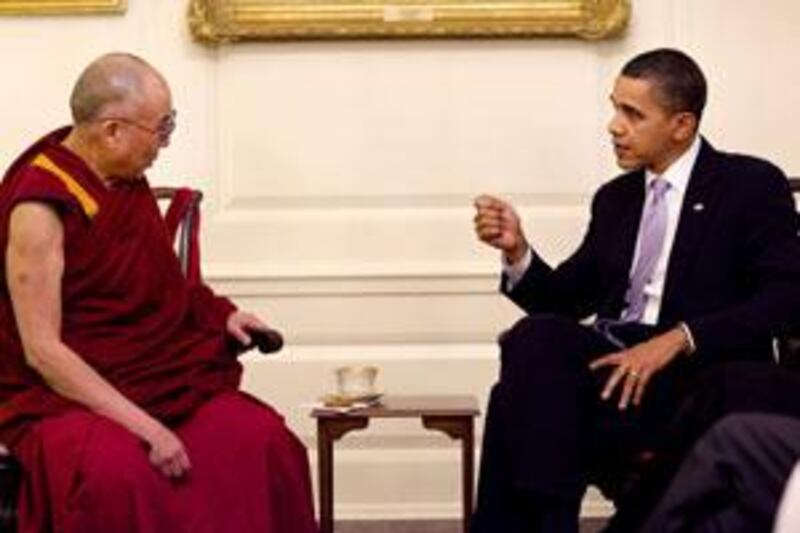WASHINGTON // China has sharply criticised Barack Obama's meeting with the Dalai Lama, summoning the US ambassador to Beijing and warning of a broader diplomatic backlash. In a statement, Chinese foreign ministry spokesperson Ma Zhaoxu expressed China's "strong dissatisfaction and firm opposition" to the meeting, saying it "severely violated the basic norms governing international relations". "The action of the US side has seriously interfered in China's internal affairs, seriously hurt the national feelings of the Chinese people, and seriously undermined China-US relations," he said, announcing that John Huntsman, the US ambassador to China, would be called in for "solemn representations".
The strong words come after China repeatedly warned Mr Obama to cancel the meeting with the Dalai Lama, who it views as a separatist aiming to establish a breakaway nation in Tibet. . The Dalai Lama, who lives in exile in India, fled China in 1959 after a failed uprising against Chinese rule. He says he does not advocate Tibetan independence but wants greater Tibetan autonomy under Chinese rule.
Some backlash was expected, and China observers say they do not expect the meeting to cause lasting injury to US-China relations. "This is not going to have any long term impact," Elizabeth Economy, the director for Asia Studies at the New York-based Council on Foreign Relations, said. "It is an issue that is going to arise every year or two, each side plays its role, and it knows what the outcome is going to be in advance."
Still, other observers such as Robert Barnett, director of the Modern Tibetan Studies programme at Columbia University in New York, said the Chinese rhetoric has been particularly harsh. "It is quite high up on their register of language they use to express protest, perhaps more than we've seen before," he said. Mr Barnett said the Dalai Lama's visit to Washington - which also included a rare visit with Hillary Clinton, the US secretary of state - directly challenges a Chinese policy, quietly instituted in 2007, to step up pressure on world leaders to dissuade them from meeting the Buddhist leader. The policy has met with some success, he said, causing leaders in Western Europe, Australia, and the Pope, to decline meetings with the Dalai Lama.
"They very much raised the rhetoric and pressure - and some people would use the word intimidation - to try to stop those meetings from happening and they were hugely successful," he said. "The success of that strategy ended with the Obama meeting ... so of course China is going to react strongly. " The fallout over the meeting comes amid an array of ongoing diplomatic disputes and rising tensions between the two countries, including the recent fallout over a US$6.4 billion (Dh24bn) arms sale to Taiwan, which China considers its province.
Reacting to the arms sale, China suspended military exchanges with the United States and security talks on a broad range of issues, including arms control and nuclear non-proliferation. The two sides also are in the midst of disagreements over trade, climate change, internet censorship and sanctions on Iran. Many aspects of the Dalai Lama's visit were choreographed so as not to further upset the Chinese. Mr Obama hosted the Dalai Lama in the White House Map Room rather than the Oval Office. The meeting took place behind closed doors and the two leaders did not jointly address the media.
In a statement, the White House press secretary, Robert Gibbs, said the president "stated his strong support for the preservation of Tibet's unique religious, cultural and linguistic identity and the protection of human rights for Tibetans" in China. Mr Obama also stressed the importance of a "positive and cooperative relationship between the United States and China". After the meeting, the Dalai Lama took the unusual step of addressing the media, saying he was "very happy" with the sit-down.
Mr Obama has sought ways to improve relations with China, hoping to secure support for efforts to counter nuclear programmes in Iran and North Korea. He put off a meeting with the Dalai Lama in October to curry favour with Beijing and also delayed the decision on the US arms sale to Taiwan. In an opinion article yesterday in the South China Morning Post, an English-language newspaper based in Hong Kong, Douglas Paal, who served on the National Security Council staffs of the presidents Ronald Reagan and George HW Bush, praised Mr Obama's effort to build a positive relationship with Beijing, saying it had yielded some subtle gains.
"The challenge in the year ahead is for both countries' political elites to strengthen their capacity to co-operate on many major issues and manage disputes on other important matters at the same time," Mr Paal, now a China expert at the Washington-based Carnegie Endowment for International Peace, wrote. "That will require the principals to look well beyond this year's mounting troubles." sstanek@thenational.ae





